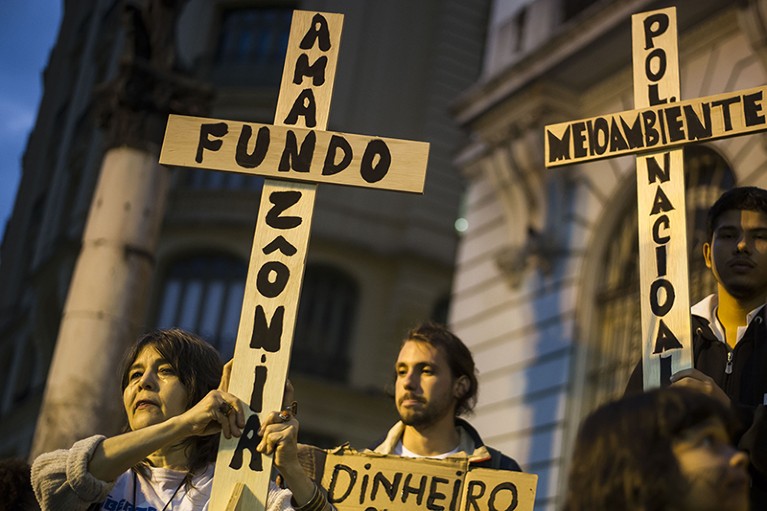
Environmental protesters in Rio de Janeiro, Brazil. The attention of world leaders on the Amazon is welcome, but their response is “a drop in the bucket”.Credit: Bruna Prado/Getty
Less than a decade ago, Brazil was an environmental leader. Its government had elevated forest conservation and sustainable development to national policy and then, with the help of satellite imagery, it had cracked down on illegal deforestation across the world’s largest tropical rainforest. Deforestation in the Amazon plummeted even as agricultural production — the biggest driver of forest loss — increased. Now, that progress is going up in smoke.
Data from Brazil’s National Institute for Space Research (INPE) showing a sharp uptick in the number of fires in the Amazon this year triggered headlines around the globe. Landowners use fire to clear forest illegally to make way for crops and cattle grazing, but Brazil’s populist president, Jair Bolsonaro, has effectively fanned the flames with his anti-environmentalist agenda since taking office in January. Scientists who live and work in the region were not surprised at what is happening, but INPE’s report sparked concerns in world capitals just as leaders of the G7 group of countries with the world’s biggest economies gathered for their annual summit in Biarritz, France.
Neither extinguishing the flames nor solving the underlying problem of deforestation will be easy. It doesn’t help that Bolsonaro is among those world leaders questioning whether an environmental agenda can deliver long-promised economic benefits. His development-at-any-cost policies hark back to an earlier era in which deforestation was treated as a measure of progress.
He has railed against regulation, cut the budget of Brazil’s environmental enforcement agency and advocated mining on lands belonging to Indigenous people. When news of the fires spread, Bolsonaro accused environmental groups of setting blazes to make him look bad. When G7 leaders pledged emergency funding to help put the fires out, he called it colonialism.
More efforts needed
The attention of world leaders on the Amazon is welcome, but their response is insufficient to deal with the scale of the crisis. The G7’s offer of US$22 million, initially rebuffed by Bolsonaro, seemed rushed. This sum would hardly fight the fires, let alone address the underlying problems. In the words of the former UN climate-secretariat chief Christiana Figueres, it was “a drop in the bucket”. On 6 September, at a forest-conservation summit convened by Brazil, seven Amazon countries pledged to work together — but provided few details on what they would actually do.
Paradoxically, there is already a large pot of money dedicated to tropical-forest conservation in Brazil. This is the Amazon Fund, established by Brazil in 2008 to attract international donations for conservation efforts. Since the fund’s inception, Norway has invested the lion’s share of the almost $1.3-billion total, while Germany has contributed another $68 million and Brazil’s national oil company, Petrobras of Rio de Janeiro, nearly $8 million. The funds have been used to pay for everything from research and land-use planning to law enforcement. But these investments were contingent on the government curbing deforestation, and both Germany and Norway have now suspended payments.
This decision is unlikely to change unless there is a shift in the Bolsonaro government’s priorities, but European Union countries could have some extra leverage. The EU has negotiated a trade agreement with several South American states, including Brazil. France and Ireland have threatened to refuse to ratify the deal — limiting Brazil’s exports of beef and soya to the EU — unless Bolsonaro changes his approach to the Amazon. Brazil’s agri-businesses are concerned about these developments. That gives them an opportunity to persuade Bolsonaro to re-engage with Europe over the Amazon if not doing so means that the interests of the country’s agricultural producers are on the line.
Fifteen years ago, many people assumed that the Brazilian government had little control or influence over illegal deforestation in the Amazon. We now know that is not true. Between 2004 and 2012, Brazil was able to curb deforestation by more than 80% while almost eliminating industrial-scale land-clearing.
The Amazon rainforest is a reservoir of biodiversity and carbon, which is locked up in trees and soils. Clearing and burning the forest to make way for agriculture destroys the former and sends the latter into the atmosphere, contributing to global warming. Brazil rightly claims sovereignty over its territory, but the forest is a global good, just as the soya beans and beef produced by farmers and ranchers there are global commodities. The responsibility for what happens on Brazil’s turf extends well beyond its borders.

 Alarming surge in Amazon fires prompts global outcry
Alarming surge in Amazon fires prompts global outcry
 ‘Tropical Trump’ sparks unprecedented crisis for Brazilian science
‘Tropical Trump’ sparks unprecedented crisis for Brazilian science
 Battle for the Amazon
Battle for the Amazon
 Scientists must rise above politics — and restate their value to society
Scientists must rise above politics — and restate their value to society





